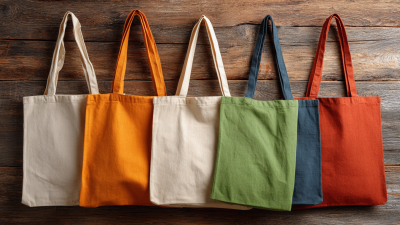
7 Proven Benefits of Using Reusable Bags for Eco-Friendly Shopping
 In recent years, the conversation around sustainability has gained significant traction, particularly in relation to eco-friendly shopping practices. One of the standout solutions in this realm is the adoption of Reusable Bags, which have been recognized not only for their convenience but also for their substantial environmental benefits. According to a report by the Environmental Protection Agency, Single-use plastic bags contribute to the staggering 300 million tons of plastic waste produced globally each year. Conversely, switching to Reusable Bags can dramatically reduce this statistic; research indicates that if every household in the U.S. used just one Reusable Bag instead of plastic bags, it would eliminate over 4 billion plastic bags from circulation annually. Such data underscores the pivotal role that Reusable Bags play in mitigating pollution and fostering a healthier planet, making them an essential choice for conscientious shoppers dedicated to making a positive impact.
In recent years, the conversation around sustainability has gained significant traction, particularly in relation to eco-friendly shopping practices. One of the standout solutions in this realm is the adoption of Reusable Bags, which have been recognized not only for their convenience but also for their substantial environmental benefits. According to a report by the Environmental Protection Agency, Single-use plastic bags contribute to the staggering 300 million tons of plastic waste produced globally each year. Conversely, switching to Reusable Bags can dramatically reduce this statistic; research indicates that if every household in the U.S. used just one Reusable Bag instead of plastic bags, it would eliminate over 4 billion plastic bags from circulation annually. Such data underscores the pivotal role that Reusable Bags play in mitigating pollution and fostering a healthier planet, making them an essential choice for conscientious shoppers dedicated to making a positive impact.
Understand the Environmental Impact of Single-Use Plastics
 The environmental impact of single-use plastics has become increasingly alarming, with recent reports highlighting the hidden health risks associated with nano- and microplastics found in disposable water bottles. As plastic production has surged over 200 times since 1950, the consequences on both our health and the environment have been profound. These plastics not only contribute to pollution but also release harmful substances that can affect human organs and systems, raising concerns from infancy to old age.
The environmental impact of single-use plastics has become increasingly alarming, with recent reports highlighting the hidden health risks associated with nano- and microplastics found in disposable water bottles. As plastic production has surged over 200 times since 1950, the consequences on both our health and the environment have been profound. These plastics not only contribute to pollution but also release harmful substances that can affect human organs and systems, raising concerns from infancy to old age.
In light of these challenges, the movement toward reusable bags for eco-friendly shopping is more crucial than ever. By opting for reusable bags, consumers can significantly reduce their reliance on single-use plastics, thereby mitigating the harmful effects of plastic pollution. Numerous cities are beginning to implement bans on these disposable items to protect the environment, reflecting a growing awareness of the need for sustainable practices. Adopting reusable bags is a simple yet effective step individuals can take to contribute to a healthier planet and promote a more sustainable future.
Explore the Health Benefits of Using Reusable Bags
Using reusable bags for shopping not only benefits the environment but also has significant health advantages. One of the primary concerns with single-use plastic bags is the potential for chemical leaching. Many disposable bags can release harmful toxins into food items stored in them, posing health risks. In contrast, many reusable bags are made from safer materials that are specifically designed for food storage, ensuring a lower chance of harmful substances entering our bodies.
Moreover, reusable bags encourage healthier shopping habits. By using them, consumers are more likely to plan their grocery trips more thoughtfully, which can lead to buying fresh, whole foods instead of processed items packaged in less sustainable materials. This shift not only fosters a healthier diet but also reinforces a more eco-conscious lifestyle. As cities and states move toward eliminating plastic bags to reduce pollution, opting for reusable alternatives becomes a proactive choice that benefits both personal health and the planet.
7 Proven Benefits of Using Reusable Bags for Eco-Friendly Shopping
| Benefit | Description | Health Impact | Environmental Impact |
|---|---|---|---|
| Reduce Plastic Waste | Reusable bags help decrease the amount of single-use plastic in landfills and oceans. | Fewer plastics can lead to improved air quality and health outcomes. | Significantly lowers the carbon footprint by reducing the need for plastic production. |
| Cost-Effective | Many stores offer discounts or incentives for using reusable bags. | Saves money over time, allowing for healthier purchases. | Reduces demand for plastic production, promoting sustainable economics. |
| Durability | Reusable bags are typically more robust than single-use plastic bags. | Less likelihood of bag breakage which reduces food contamination risks. | Less frequent replacement of bags means lower resource consumption. |
| Versatility | Can be used for various purposes beyond just shopping. | Encourages healthier lifestyle choices with their varied uses. | Promotes a culture of reusability and multifunctionality. |
| Customization | Many reusable bags can be customized with designs or logos. | Inspires pride in personal choices that support health and environment. | Encourages brand responsibility towards sustainability. |
| Improved Hygiene | Reusable bags are generally easier to clean than plastic ones. | Maintains cleanliness, reduces bacteria transfer between groceries. | Contributes to less waste in the cleaning process of bags. |
| Community Awareness | Using reusable bags can promote environmental awareness in communities. | Encourages healthier community practices through shared values. | Fosters collective action towards environmental sustainability. |
Discover Cost Savings Over Time with Reusable Bags
Switching to reusable bags for your shopping needs not only benefits the environment but also offers significant cost savings over time. While the initial investment in high-quality reusable bags may seem more than the price of single-use plastic bags, the long-term financial benefits are undeniable. Many grocery stores and retailers provide discounts for customers who bring their own bags, which adds up to noticeable savings with each shop.
Additionally, reusable bags are designed for durability and can withstand numerous uses without the wear and tear associated with disposable bags. This longevity means you won't need to constantly replenish your supply of bags, translating into further savings as you minimize your purchase of single-use bags. By making the switch to reusable bags, you can enjoy the double advantage of contributing to a healthier planet while also filling your wallet over time.
7 Proven Benefits of Using Reusable Bags for Eco-Friendly Shopping
This chart illustrates the estimated cost savings over time when using reusable bags in comparison to single-use plastic bags. The data represents annual savings for an average shopper based on usage frequency.
Learn How to Choose the Right Reusable Bags for Your Needs
When it comes to eco-friendly shopping, choosing the right reusable bags is crucial for reducing our carbon footprint and supporting sustainable practices. There are various types of reusable bags available, each catering to different needs and preferences.
 Cotton and jute bags are popular choices due to their biodegradable nature and durability. According to a study from the U.S. Environmental Protection Agency (EPA), switching to reusable cotton bags can reduce plastic bag consumption by up to 500 bags per person annually.
This significant reduction not only helps decrease plastic waste but also conserves resources used in manufacturing single-use bags.
Cotton and jute bags are popular choices due to their biodegradable nature and durability. According to a study from the U.S. Environmental Protection Agency (EPA), switching to reusable cotton bags can reduce plastic bag consumption by up to 500 bags per person annually.
This significant reduction not only helps decrease plastic waste but also conserves resources used in manufacturing single-use bags.
Plastic substitutes like reusable polypropylene bags are also gaining popularity for their sturdiness and water resistance, making them ideal for groceries or heavy items. A report by the European Commission suggests that the cumulative impact of using reusable bags, made from sustainable materials, could save over 4 million tons of CO2 emissions each year. Furthermore, materials such as recycled polyester offer an innovative approach by repurposing existing plastics, contributing to a circular economy. By carefully selecting reusable bags that align with both functionality and environmental benefits, consumers can make informed choices that positively impact the planet.
Tips for Maintaining and Cleaning Your Reusable Bags Efficiently
When integrating reusable bags into your eco-friendly shopping routine, proper maintenance and cleaning are essential for both longevity and hygiene. According to a report by the Environmental Protection Agency (EPA), switching to reusable bags can reduce plastic waste by up to 33 billion bags annually. However, many consumers overlook the need to keep these bags clean, which can lead to bacterial growth and odors. Regular maintenance can ensure that your investment in reusable bags remains beneficial for the environment and for your health.
One practical tip for maintaining your reusable bags is to wash them regularly, especially after transporting raw food or groceries. The American Cleaning Institute recommends using hot water and mild detergent for cotton and polyester bags, which can efficiently eliminate germs. If you have plastic-lined bags, simply wipe them down with a disinfectant solution. Additionally, it's essential to let them dry completely before storing to prevent mildew and unpleasant odors.
Storing your reusable bags in a designated, clean area can also prolong their lifespan. Consider keeping them in your vehicle or by the front door to avoid forgetting them during shopping trips. Implementing these simple cleaning and storage habits can contribute significantly to reducing environmental waste while ensuring your reusable bags remain safe and functional for all your shopping needs.
Related Posts
-

Exploring the Versatility and Advantages of the Best Reusable Bags for Every Occasion
-

What are the Benefits of Choosing the Best Reusable Bags for Your Lifestyle
-

The Ultimate Guide to Choosing the Best Reusable Bags for Every Lifestyle
-

Partner with China for the Best Printed Bags Designed to Enhance Your Global Supply Chain
-

Exploring the Unique Features and Applications of Premium Large Poly Mailers
-

Elevate Your Business with Poly Mailer Bags at the Record-Breaking 137th Canton Fair 2025!



